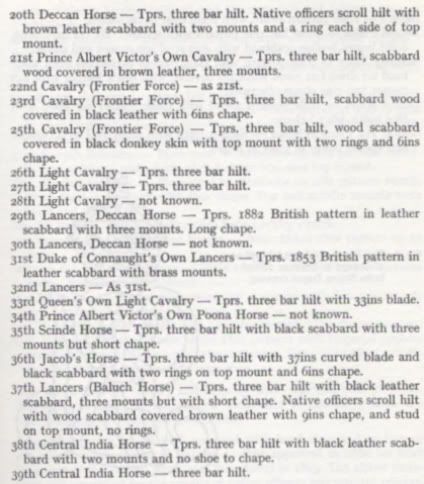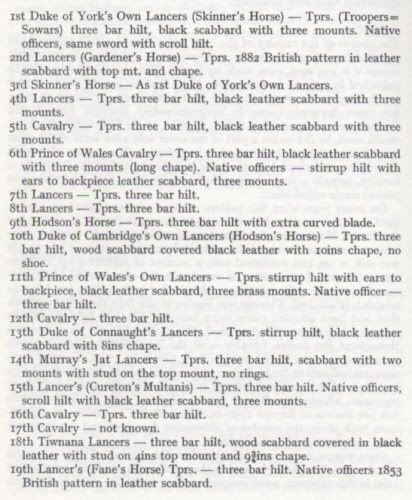
 |
|
|
|
|
#1 |
|
Member
Join Date: Dec 2004
Location: What is still UK
Posts: 5,807
|
Not really my thing this but when you have OCD these things happen. Heavy blade, wood grips, leather covered wood scabbard. No marks!! Wide fuller on both sides. Very nice balance to a heavy and quite flexible bladed weapon. Just a little damage to the scabbard tip
 . Some of you seem a little keen and knowledgeable about this sort of creation, I do not really go for service stuff so any info about it would be nice to hear. . Some of you seem a little keen and knowledgeable about this sort of creation, I do not really go for service stuff so any info about it would be nice to hear.
|
|
|

|
|
|
#2 |
|
Member
Join Date: Dec 2004
Location: What is still UK
Posts: 5,807
|
I got this sword this morning, it was bit of an impulse buy. Now I have had time to look in some books I think it is the Indian Army version of the British Cavalry troopers 1853 saber. Obviously the blade is made to the local fashion.
|
|
|

|
|
|
#3 |
|
Vikingsword Staff
Join Date: Nov 2004
Posts: 6,293
|
Is there a name for this feature on the spine where the false edge begins ?
Looks like a good no nonsense weapon Tim; fully functional beauty . |
|
|

|
|
|
#4 |
|
Member
Join Date: Dec 2004
Location: What is still UK
Posts: 5,807
|
The few books I have on military swords only have a slight mention of Indian Army swords except the 1903 or is it 06 pattern adopted by all English speaking countries. I can find no mention of the piece before the false edge. The sword has certainly see some action. Border line ethnographic but tells a story.
|
|
|

|
|
|
#5 |
|
Member
Join Date: Dec 2004
Location: Italia
Posts: 1,243
|
Hello Tim, I like it
 
|
|
|

|
|
|
#6 |
|
(deceased)
Join Date: Dec 2004
Location: East Coast USA
Posts: 3,191
|
Tim
A nice blend of east and west  The blade seems to be typical tulwar style in design. If you really hate it I would be glad to take it off your hands The blade seems to be typical tulwar style in design. If you really hate it I would be glad to take it off your hands  Lew |
|
|

|
|
|
#7 | |
|
Member
Join Date: Jan 2006
Location: Kent
Posts: 2,653
|
Quote:
|
|
|
|

|
|
|
#8 |
|
Arms Historian
Join Date: Dec 2004
Location: Route 66
Posts: 9,944
|
While the progression of British military regulation pattern swords was well documented and has very good resources identifying them ("Swords of the British Army" by Robson, the most recent and comprehensive), the swords of the British native cavalry units are only vaguely described.
It is true that Wilkinson-Latham is one of the famed sword making dynasty in England, and as others, such as John Wilkinson, who has also written on these weapons, have had considerable resources which describe the historical data involving that firms extensive production. This sword certainly is in the style of the regulation M1853 cavalry sabre, although it is of course not one of the regulation issue examples. There were examples of these produced for native regiments in India, one group having been produced by a Rodwell & Co. I think around the late 19th c. but I do not have details handy at the moment. The typical colonial sabres made in around the 1880's for some of the cavalry units were made in the form known as the 'gothic hilt' and were patterned after the M1821 light cavalry sabre with three bar hilt. It is also known that the stirrup hilt sabres of the M1796 light cavalry sabre, with the hatchet point, were produced also in the latter 19th c. by makers who consigned to supply forces in the Raj, one such firm was J.Bourne & Sons. These stirrup hilt sabres were still in armouries as late as the 1930's This sabre is likely end of 19th c. to early yrs 20th and as noted the 'step' preceding the false edge is most interesting, forming a form of 'choil' on the sharpened back edge. Most interesting sword!! Best regards, JIm |
|
|

|
|
|
#9 |
|
Member
Join Date: Dec 2004
Location: What is still UK
Posts: 5,807
|
Jim I can see the feature "choil" working on a knife/ survival knife, being very handy, but I cannot see that function on a sword. Is it possible that the chiol on the sword is more of a sighting device to ensure the best delivery of sword cut. By the way google images "British India army cavalry" some interesting pictures, skinners horse ect.
|
|
|

|
|
|
#10 | |
|
Member
Join Date: Mar 2014
Location: USA
Posts: 34
|
Quote:
|
|
|
|

|
|
|
#11 |
|
Member
Join Date: Dec 2004
Location: Ann Arbor, MI
Posts: 5,503
|
Some time ago I asked a question whether tulwars with classical indo-persian handles continued to be manufactured in the 20th century as regulation swords for Indian military. The answer was inconclusive: Swords were made for the cavalry, but what kind?
From this thread it appears that there already were regulation swords with EUROPEAN style handles. So my question still stands: were tulwars still used by the Indian military or were they summarily replaced? |
|
|

|
|
|
#12 | |
|
Member
Join Date: Mar 2014
Location: USA
Posts: 34
|
Quote:
|
|
|
|

|
|
|
#13 |
|
Member
Join Date: Dec 2004
Location: What is still UK
Posts: 5,807
|
It seems that Indian Army cavalry swords vary considerably this only represents some. The following pages come from " Pictorial History Swords & Bayonets, R.J.Wilkinson-Latham " He suggests that the three bar hilt took over from the stirrup hilt in 1860. I find it a trifle amusing how authors who were not there and not manufactures come out with such bold and definite opinions.
  Some swords and steel scabbards made in the UK. Others were just the sword and Indian made scabbards and some were Indian made swords with the hilts supplied by the UK |
|
|

|
|
|
#14 |
|
Member
Join Date: Dec 2004
Posts: 1,712
|
Actualy Tim I think you may find Robert Wilkinson-Latham was the fifth generation running of his family to be involved with Wilkinson Sword Ltd.
Spiral |
|
|

|
|
|
#15 |
|
Member
Join Date: Dec 2004
Location: What is still UK
Posts: 5,807
|
Yes indeed but they did not make them all and certainly not when he was a boy.
|
|
|

|
|
|
#16 |
|
Member
Join Date: Dec 2004
Location: What is still UK
Posts: 5,807
|
I like the almost "gone native" british officer in this picture of irregular cavalry.

|
|
|

|
|
|
#17 |
|
Member
Join Date: Dec 2004
Location: What is still UK
Posts: 5,807
|
Nice pictures.
www.members.tripod.com/~Glosters/IAcavalry1.htm |
|
|

|
|
|
#18 |
|
Member
Join Date: Dec 2004
Location: What is still UK
Posts: 5,807
|
I took this sword to a military sword buff and he said it is 100% Indian manufacture just a copy hilt. it also appears that the grip is not wood or leather as on the British swords. What ever it is it is hard and in parts there seems to be something like a grain structure. Could it be stained ivory? That seems rather extravagant but in the late 19th early 20th cent it was used with gay abandon. I am not sure if it is safe to speak like that these days
 . I dare not clean a section to look see. . I dare not clean a section to look see.
|
|
|

|
|
|
#19 |
|
Member
Join Date: Oct 2017
Posts: 3
|
Hello, I realise this quite an old thread, but I have just come into possession of the exact same sword and wondered if anyone knew the history of the one in this thread
Thanks |
|
|

|
|
|
#20 |
|
Vikingsword Staff
Join Date: Dec 2004
Location: The Aussie Bush
Posts: 4,198
|
Welcome to the forum, donaghy77.
More pictures of this sword would be helpful I think. Ian Last edited by Ian; 29th October 2017 at 09:36 PM. |
|
|

|
|
|
#21 |
|
Arms Historian
Join Date: Dec 2004
Location: Route 66
Posts: 9,944
|
This was a wonderful thread and good to see it up again,
the M1853 was indeed used as a select pattern for certain units. The Wilkinson Latham book lists these in its survey of chosen types for the units. It is a shame that Mr. Wilkinson Latham has dropped out of the forum scene as SFI has gone defunct. There is no doubt there are others of this India made pattern out there and he would know of them. |
|
|

|
|
|
#22 |
|
Member
Join Date: Oct 2017
Posts: 3
|
Ian
I have just worked out how to add pictures, poor show when a lot of my job involves IT, I hope you like them, I have spoken to Jim who has been brilliant with bringing his encyclopaedic knowledge to bear |
|
|

|
 |
|
|